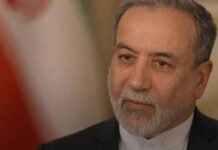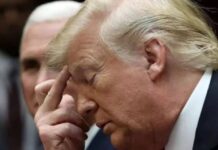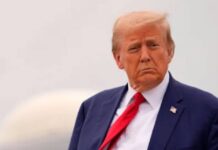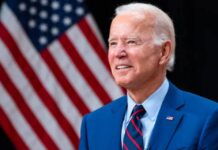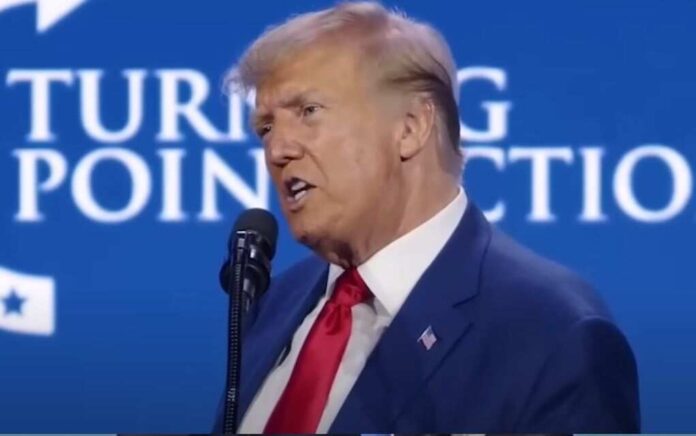
Americans wait with bated breath to see what’s going to happen in the Trump indictment trials. Now a major ruling has been reached.
As a Federal Judge has handed down this huge decision on the Trump hush-money case.
On Wednesday, U.S. District Judge Alvin K. Hellerstein ruled against the former president’s request to have the jurisdiction of his hush-money criminal case transferred from New York state court to federal court.
Hellerstein concluded that the charges did not involve official presidential tasks and were instead related to Trump’s private life.
Hellerstein concluded after reading the evidence in a 25-page opinion that “the matter was a pure a personal item of the President — a cover-up of an embarrassing event.”
“Hush money paid to an adult film star is not related to a President’s official acts. It does not reflect in any way the color of the President’s official duties.”
Hellerstein’s ruling clears the way for Trump to be tried in Manhattan state court as soon as next spring, coinciding with the 2024 presidential primary season and setting the stage for what could be a frenzied period of judicial action as the twice-indicted Republican pursues a return to the White House.
In a separate case, Trump is accused of illegally storing secret federal materials at his home in Mar-a-Lago and obstructing investigators in a federal court in Florida. That case is scheduled for trial in December, according to the prosecution.
After Hellerstein’s ruling, the Manhattan district attorney’s administration, which is litigating the hush-money case and had sought to retain it in state court, expressed its “very pleased” satisfaction. Attorney for Trump Todd Blanche would not comment. The decision may be challenged in the United States Court of Appeals for the Second Circuit.
Hellerstein gave a strong hint of his decision at a hearing on June 27 in which he mocked Trump’s defense team’s contention that Trump’s alleged conduct at the heart of the charges was within the “color of his office” as president, specifically, Trump’s reimbursement of his longtime private attorney Michael Cohen as part of an attempt to cover up the affair accusations that arose during his first campaign.
The court ruled that the prosecution had presented sufficient evidence to prove that Cohen had received repayment for a hush-money payment.
Trump pled not guilty to 34 counts of criminal fabricating business documents on April 4 in state court. The charges stem from Trump’s alleged role in covering up Cohen’s reimbursement of $130,000 to adult actress Stormy Daniels for her role in paying off Trump’s alleged extramarital affair with Daniels.
Cohen also orchestrated the National Enquirer paying Playboy star Karen McDougal $150,000 for access to her story about a suggested affair, which the magazine promptly buried in a questionable example of “catch-and-kill.”
Trump has consistently denied any sexual relations with any lady other than his wife. His legal team insists the money paid to Cohen was for legitimate legal fees and was not a cover-up.
Since a portion of the alleged actions took place in 2017 while he was president, including checks he allegedly wrote while sitting in the Oval Office, Trump’s attorneys have argued that he cannot be convicted in state court and have asked for a federal court to gain authority over the hush-money case.
Trump’s lawyers argued that any allegations against their client stemming from “conduct performed while in office” should be heard in federal court, where all other federal officers are also subject to trial.
If the case had been moved to federal court, the jury would have included residents not only of Trump’s most politically unpopular borough of Manhattan but also of Trump’s most politically supportive boroughs in the northern suburbs.
District Attorney Alvin Bragg’s senior lawyer, Matthew Colangelo, contended that none of the hush-money payments or reimbursements were related to Trump’s constitutional responsibilities as president. He also cast doubt on whether a president falls under the legal classification of “federal officer” or whether it solely refers to other government officials.
Criminal proceedings in the United States may be transferred from state to federal court under certain circumstances, including when they include federal government personnel acting in the course of their official duties. Due to the fact that Trump is the first sitting president to be indicted, his request was extraordinary.
Had Judge Hellerstein agreed with Trump and transferred the case to federal court, the former president’s legal team might have attempted to have the charges dropped on the basis that government employees have immunity from prosecution for activities performed in the course of their official responsibilities.
The judge, however, stated that neither of these arguments would have worked since Trump had not explained “how hiring and making payments to a personal attorney to handle personal affairs carries out a constitutional duty.”
In addition to the merits of the lawsuit, Trump wanted to take it to federal court because he didn’t believe he would be treated fairly if it stayed in state court.
It’s hard to disagree with him with the way everything has played out so far.
Stay tuned to the Federalist Wire.


